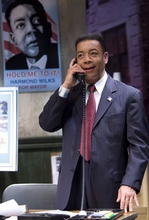SITE GUIDE
SEARCH
REVIEWS
REVIEW ARCHIVES
ADVERTISING AT CURTAINUP
FEATURES
NEWS
Etcetera and
Short Term Listings
LISTINGS
Broadway
Off-Broadway
NYC Restaurants
BOOKS and CDs
OTHER PLACES
Berkshires
London
California
New Jersey
Philadelphia
Elsewhere
QUOTES
TKTS
PLAYWRIGHTS' ALBUMS
LETTERS TO EDITOR
FILM
LINKS
MISCELLANEOUS
Free Updates
Masthead
A CurtainUp Review
Radio Golf
| You the cowboys and I'm the Indians. See who wins this war.—Sterling Johnson
|

Walter Coppage as Harmond Wilks
(Photo: Scott Suchman) |
Their redevelopment project of homes and shops such as Whole Foods, runs into snags —- personal and financial. The most obvious obstacle being "Elder" Joseph Barlow, who would like to be thought of as a doddering old fool, but is in fact as crazy as a fox. As Barlow, Frederick Strother, who has worked for many years on Washington's stages, turns in his best performance to date. His comic timing is perfect. A large man, who towers over the actors he is tormenting with his wily ways, Strother is funny. And clever. And purposeful. His challenges to Wilks (convincingly played by Walter Coppage) and Hicks (Kim Sullivan, whose charm makes you understand how he trumps the questionable morals of his deals) belie his appearance. No fool he; he's as sharp as a tack.
Rounding out the ensemble, fine tuned by director Ron Himes, are the hard-driving but not hard-hearted Deidra LaWan Starnes as Mame Wilks, Harmond's politically ambitious wife, dressed (by Reggie Ray) most appropriately in suits that say she means business; Erik Kilpatrick as Sterling Johnson, the orphan who got into trouble, became an odd job man, and in spite of or maybe because of living hand-to-mouth, maintains a sense of right and wrong. He is the conscience of the piece.
For those of us who find most of August Wilson's work too talky and repetitious, Radio Golf is an eye-opener. Although the second act drags a bit, this otherwise excellent production takes you into the conflicts of socio-economic standing, of morals, of ambition and the lack of it within the African-American community.
To see Radio Golf at Washington's Studio Theatre on 14th Street, NW. is particularly poignant. After Martin Luther King was shot in 1968, the area was burned down by its hurt and angry residents. Its fate for the next two decades was what the "blight" referred to in the play. Thirty years ago, a theater troupe headed by Joy Zinoman moved in. Partly thanks to that theater's pioneering spirit in terms of real estate, 14th Street today is one of the city's most vibrant, multi-culti neighborhoods. Upscale ethnic restaurants, furniture stores, million dollar condos, and Whole Foods are neighbors to the 4-stage Studio Theatre, sometimes called the Zinoplex.
Editor's Note: For more about August Wilson, with links to other productions of Radio Golf we've reviewed, as well as his other plays, see our new August Wilson backgrounder
|
Radio Golf By August Wilson Director: Ron Himes Cast: Walter Coppage (Harmond Wilks), Erik Kilpatrick (Sterling Johnson); Deidra LaWan Starnes (Mame Wilks); Frederick Strother ("Elder" Joseph Barlow); Kim Sullivan (Roosevelt Hicks). Setting: Daniel Conway Lighting: Colin K. Bills Costumes: Reggie Ray Sound: Neil McFadden Running time: Two and a half hours, one intermission. Studio Theatre, 1501 14th St., NW; Washington, DC;202-332-3300; www.studiotheatre.org From May 20, 2009; opening May 24, 2009; closing June 28, 2009. Review, by Susan Davidson, based on May 24, 2009 matinee performance. |
|
REVIEW FEEDBACK Highlight one of the responses below and click "copy" or"CTRL+C"
Paste the highlighted text into the subject line (CTRL+ V): Feel free to add detailed comments in the body of the email. . .also the names and emails of any friends to whom you'd like us to forward a copy of this review. You can also contact us at Curtainup at Facebook or Curtainup at Twitter |
Try onlineseats.com for great seats to
Wicked
Jersey Boys
The Little Mermaid
Lion King
Shrek The Musical

South Pacific

In the Heights

Playbill 2007-08 Yearbook

Leonard Maltin's 2008 Movie Guide


Wicked
Jersey Boys
The Little Mermaid
Lion King
Shrek The Musical

South Pacific

In the Heights

Playbill 2007-08 Yearbook

Leonard Maltin's 2008 Movie Guide


